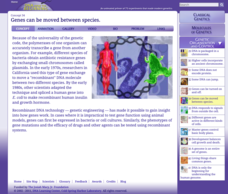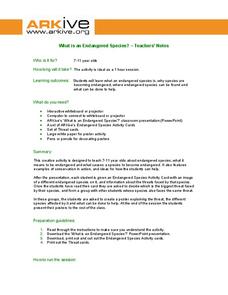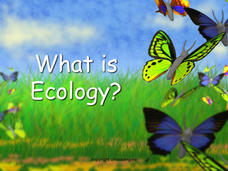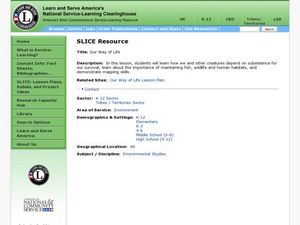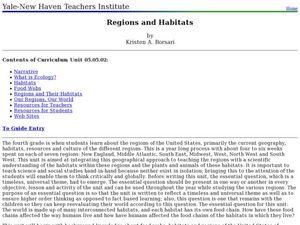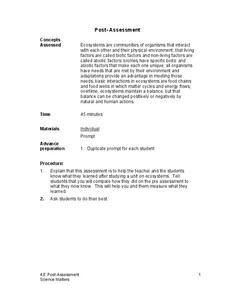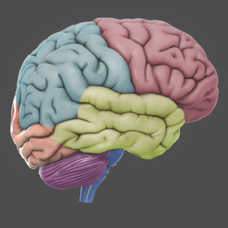Cold Spring Harbor Laboratory
Genes Can Be Moved Between Species
Biotechnology changes lives every day, but how did it all start? Learn about Cohen and Boyer's technique for recombinant DNA and the founding of this new scientific study. Then, scholars use the online interactive to discover how Hanahan...
Cold Spring Harbor Laboratory
Some DNA Does Not Encode Protein
Roy John Britten easily earned a PhD in nuclear physics—but he found painting with water colors too difficult. Young scientists learn about Britten's life, career, and research with an online interactive. They read a biography, view...
ARKive
What is an Endangered Species?
Even kids in grades two through five can start thinking about the part they play in sustaining endangered species. They consider what endangered species are, how they become endangered, and what conservationists can do to help. In...
Biology Junction
What Is Ecology?
Do you know the name for the biological study of interactions? A short presentation with accompanying worksheet introduces individuals to ecology. The materials offer a broad overview of the subject and the levels of organization to...
Cold Spring Harbor Laboratory
Children Resemble Their Parents
Gregor Mendel's work revolutionized agriculture from an art to a science. Explore Mendel's work with an interactive lesson that includes animations, video, and practice problems. The instruction describes the early discoveries that...
Cold Spring Harbor Laboratory
Some Types of Mutations Are Automatically Repaired
Does natural light damage or repair DNA? Learn the answer discover the scientists who researched the topic with an online interactive. Scholars read through an online animation presenting the content at their own pace. Then, they read...
Curated OER
Our Way of Life
Learners interview Native American Elders about animal migration, traditional food gathering, and subsistence. They research endangered animals, draw a game cycle, and create maps of local migration of animals.
Curated OER
What Do We Have In Common?
Seventh graders perform a dissection on a mussels and label their internal organs. In groups, they compare and contrast the mussels structure to those of human beings. They also review the functions that are necessary for survival and...
Curated OER
Help! Someone Has Destroyed My Home!
Fifth graders use a mystery bag to discover ways in which humans endanger the life of animals by changing their habitat. In this animal habitat instructional activity, 5th graders work with a partner to design a solution to the problem...
Curated OER
The Envelope Please
Young scholars examine and research the importance and functions of the skeletal system in vertebrates. They construct a 10-foot geodesic dome to illustrate the importance of architectural frameworks and create a clay animation movie.
Curated OER
Who Lives Here: Otter, Grey Squirrel, Badger, Rabbit or Fox?
In this animal habitat worksheet, learners read five clues pertaining to the homes of the otter, grey squirrel, badger, rabbit and fox. Students tell what animal lives in each place. This appears to be an online interactive worksheet.
Curated OER
Panther Scavenger Hunt
Young scholars examine the Florida Panthers through a Web-quest. In this web-based lesson, students find clues that will help them to identify the habitat of the Florida Panther and the history of human activity which threatens these...
Curated OER
Anatomy: Circulatory System
Young scholars use the Internet to research the circulatory system. They explore the different organs of the circulatory system and their functions. There are animations, online quizzes, games, and interactive tours of this system.
Curated OER
The Wild Dolphin Project
Inspire young marine biologists to study animals in the wild with this assignment. Pupils view an eight-minute video and read an article in the New York Times about Denise Herzing's 25-year long study of dolphins in their own...
Curated OER
The Chesapeake Bay in Captain John Smith's Time
When Captain John Smith visited the Chesapeake Bay in the summer of 1608, what types of animals and habitats did he encounter? Your young historians will analyze primary source documents to answer this question, as well as compare...
Curated OER
The Beagle Brigade
Students develop an understanding of animal behaviors through reading a case study about detector beagles. They explore the interaction of innate abilities and learned behaviors.
Curated OER
Exploring Ecosystems
Students examine the relationships between plants, animals, and the environment in ecosystems. They sort animal cards, collect natural materials from the schoolyard, and record an ecosystem web in the form of a poster.
Curated OER
Giraffe Riff Raff
Students study the effects of wildlife conservation and relocation. In this conservation lesson students view video on the preservation of the giraffe populations and discuss the impact that humans have had on them.
Curated OER
Regions and Habitats
Fourth graders identify the different habitats found in the seven regions of the United States. In this ecology lesson, 4th graders write an essay about how humans affect the ecosystem and vice versa. They discuss how changes on one...
Curated OER
Local Environmental Issues: Pollution
Third graders discuss the ways in which human interaction with the environment and production of waste products contribute to pollution. Through a pollution demonstration, they explain how various groups of plants and animals can be...
Serendip
Structure and Function of Cells, Organs and Organ Systems
Cells of different organs have unique cell functions. Learn how cell functions vary depending on their roles in the body using an inquiry-based activity. Scholars analyze the cell structure to make comparisons to its functions, allowing...
Science Matters
Ecosystem Pre-Assessment
Test scholars' knowledge of ecosystems with a 20-question pre-assessment. Assessment challenges learners to answer multiple choice questions, read diagrams, and complete charts.
Science Matters
Post-Assessment
Twenty questions make up an assessment designed to test super scientists' knowledge of ecosystems. Scholars answer multiple-choice and short-answer questions about organisms, food chains, energy flow, and more.
Cold Spring Harbor Laboratory
3D Brain
Imagine being able to rotate the brain and view interior structures without dissection! This tool allows anatomy masters to do just that. They also learn about the associated functions, disorders, and symptoms of damage to each...
